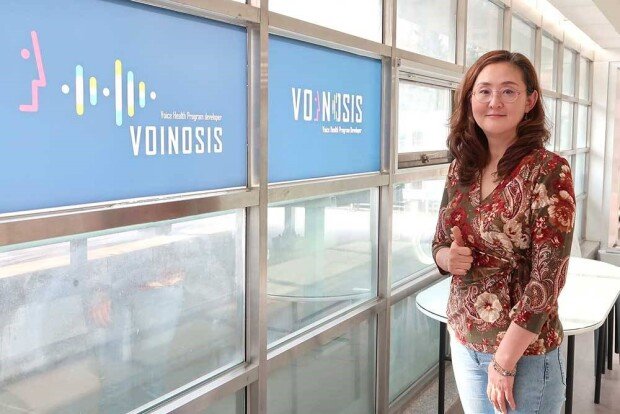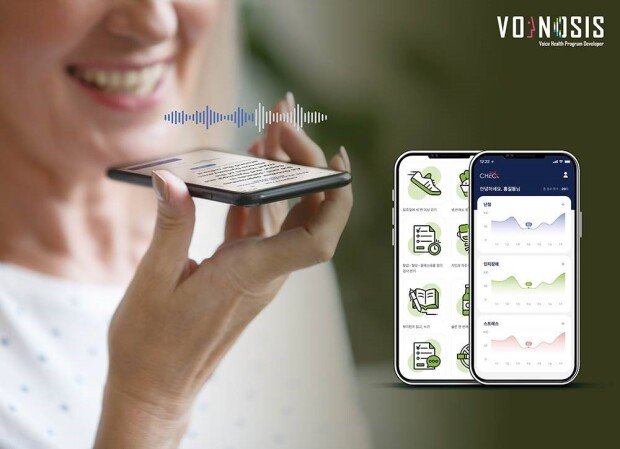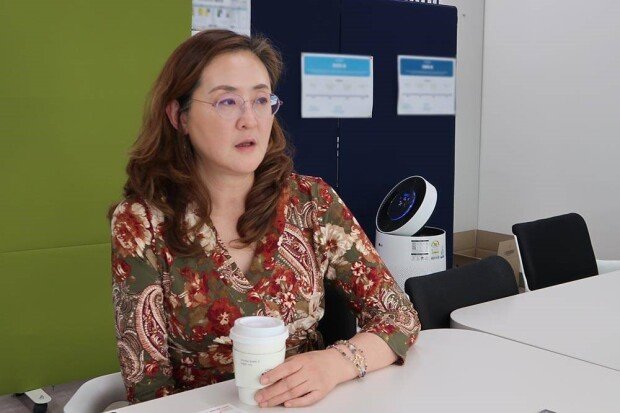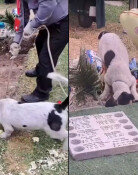Voinosis: Early Detection of Cognitive Impairment and Dementia Through Voice Analysis
Voinosis: Early Detection of Cognitive Impairment and Dementia Through Voice Analysis
Posted December. 24, 2024 11:33,
Updated December. 24, 2024 11:33
Voinosis is developing a voice-based solution for the early detection of cognitive impairment and dementia. By analyzing voice data, this solution can identify the potential onset of these conditions, even during asymptomatic stages. Voinosis leverages the extensive experience and expertise of Grace Jung Eun Shin, an ENT specialist, and incorporates AI technology to develop advanced voice analysis capabilities.
Voinosis’ voice analysis technology was recognized globally when it won first place at the 2023 IEEE International Conference on Acoustics, Speech, and Signal Processing (ICASSP) MADRess Challenge, a global competition for AI-assisted methods of Alzheimer’s disease detection.
Currently, Voinosis has developed the hospital-based solution called "Brain Guard Doctor," the app service "Voice Check" for general users, and the auditory cognitive rehabilitation digital therapeutic "HAHA (Hear Again Healing Again)." Brain Guard Doctor and HAHA are undergoing certification by the Ministry of Food and Drug Safety, while Voice Check was launched in December. Voinosis also has plans for global expansion, including proof-of-concepts and clinical trials to be carried out in collaboration with telecommunications companies and medical schools in the U.S. by 2025.
We met with Grace Jung Eun Shin, the CEO of Voinosis, who aims to create a healthier society through the early detection of cognitive impairment and dementia, and discussed the company's voice analysis technology and solutions.
 Jung Eun Shin, CEO of Voinosis / Source: IT DongA
Jung Eun Shin, CEO of Voinosis / Source: IT DongA
Developing a Solution for Early Detection of Cognitive Impairment and Dementia
IT DongA: Could you introduce yourself for our readers?
Grace Jung Eun Shin: Hello, my name is Grace Jung Eun Shin, and I am the CEO of Voinosis. I graduated from Seoul National University College of Medicine, and currently work as a professor in the ENT department and as head of the Clinical Research Center at Konkuk University Hospital. My research on the mechanisms and treatments for age-related hearing loss led me to develop an interest in AI. Combining medicine and AI inspired me to establish Voinosis to develop solutions for detecting cognitive impairment and dementia.
IT DongA: What motivated you to establish Voinosis?
Grace Jung Eun Shin: Over my 22 years of treating patients with hearing aids, I frequently encountered patients whose conditions worsened from simple hearing loss to age-related hearing loss, and then to cognitive impairment and dementia.
Voice production requires the coordinated movement of many muscles as air from the lungs passes through the vocal cords. Cognitive impairment disrupts this coordination. My experience and acute hearing, honed through years of playing the violin, enabled me to detect subtle changes in patients' voices.
I noticed a consistent pattern in these patients, which led me to believe that combining my expertise and experience with AI could enable the early detection of cognitive impairment and dementia through analysis of acoustic characteristics of voice. This realization led me to establish Voinosis in 2019.
IT DongA: Could you explain what Voinosis does?
Grace Jung Eun Shin: Voinosis develops voice-based AI solutions for detecting cognitive impairment and dementia. By monitoring degenerative changes in brain cognitive function before the onset of symptoms, we aim to prevent dementia by treating it at an earleist stage possible.
The name "Voinosis" combines "VOICE" and "DIAGNOSIS," reflecting our mission of helping individuals maintain healthier lives by leveraging voice acoustic features and AI voice analysis technology.
AI-Based Voice Analysis Technology
IT DongA: Could you elaborate on the AI technology developed by Voinosis?
Grace Jung Eun Shin: AI requires high-quality data, manpower, and infrastructure. While data quantity is important, quality is paramount. At Voinosis, as an ENT specialist, I have been able to gather meaningful voice and medical data on patients with early cognitive impairment and dementia.
Collaborating with Professor Eun Yi Kim’s computer engineering research team at Konkuk University allowed us to combine our medical expertise with AI development. Our approach exclusively focuses on acoustic data, bypassing language and text barriers.
This approach enabled us to achieve first place in the MADRess Challenge at the 2023 IEEE ICASSP. We predicted dementia in multilingual environments with 87% accuracy, and achieved a margin of error of less than 3.7 for predicting cognitive impairment severity.
 Voice Check evaluates hearing loss, cognitive impairment, and stress through voice analysis. / Source: Voinosis
Voice Check evaluates hearing loss, cognitive impairment, and stress through voice analysis. / Source: Voinosis
IT DongA: Please introduce us to your cognitive impairment and dementia screening solutions.
Grace Jung Eun Shin: Using our proprietary voice analysis technology, we have developed the hospital solution Brain Guard Doctor, the app service for the general public Voice Check, and the auditory cognitive rehabilitation digital therapy HAHA.
Brain Guard Doctor is a solution that digitizes the traditional mini-mental state examination for dementia screening using AI. It offers improved accuracy and accessibility through voice-based diagnostics, providing results within three seconds. The preclinical trials have been completed at Konkuk University Hospital, and we are currently undergoing procedures for approval from the Ministry of Food and Drug Safety (MFDS). The product is scheduled for release in the second half of 2025 and will be offered to hospitals, clinics, and welfare facilities.
Voice Check is an app designed to be used easily by the general public. It tests a user's voice and assigns a brain health score between 1 and 100. Depending on the score, individuals at risk of cognitive impairment or dementia will receive guidance on prevention and health management. Users can view changes in their scores over time via graphical representations, making it easier to identify abnormalities. The app is currently available for download from the Google Play Store, with registration on the Apple App Store underway and expected soon.
HAHA is a digital therapy for auditory cognitive rehabilitation. During the asymptomatic stage, most individuals experience a decline in auditory cognition, which HAHA helps address through rehabilitation to prevent progression to cognitive impairment. It provides personalized rehabilitation programs based on tests and current conditions, offering hyper-personalized solutions depending on the user's progress and daily state. Development has been completed, and we are preparing for MFDS approval.
IT DongA: I understand Voinosis has achieved some significant milestones. Could you share some information about them?
Grace Jung Eun Shin: We have been selected for the K-Startup Challenge by the Korea Startup Promotion Agency, the Deep Tech Private Investment-Driven Technology Startup Support Program (TIPS) by the Ministry of SMEs and Startups, and the Super Gap Startup 1000+ Project, recognition of our technological capabilities and growth potential. In addition, we were chosen for the Hyundai Open Innovation Lounge PoC program and the LG Incubator Program in its third cohort. These opportunities have paved the way for us to accelerate our commercialization efforts next year.
 Voice Check combines voice analysis technology with Voinosis solutions. / Source: IT DongA
Voice Check combines voice analysis technology with Voinosis solutions. / Source: IT DongA
Preparing for Global Expansion in 2025
IT DongA: Could you elaborate on what kind of support SBA provided?
Grace Jung Eun Shin: With support from SBA, we participated in the POSCO Open Innovation Program IMP (Idea Market Place). This program is designed to provide opportunities for promising startups to expand their technologies into the global market, making it a perfect fit for our goals. Through POSCO IMP, we are developing global language packs, preparing for global service launches, securing FDA approval, and pursuing global investment and strategic partnerships. In addition, SBA offers a variety of programs, including PR, marketing, networking, and investor connections, which have greatly facilitated our business expansion and growth.
IT DongA: Finally, could you share some of your future plans and goals?
Grace Jung Eun Shin: Starting in 2025, we plan to actively enter the global healthcare market. Our primary target is the U.S., where we are currently preparing proof-of-concepts with major telecom companies and clinical trials with medical universities.
We will continue our R&D efforts to enhance voice data collection and AI technology development. Long term, we aim to identify additional conditions that can be screened via voice analysis and develop corresponding solutions.
Our ultimate goal is to contribute to building a healthier society by screening cognitive impairment and dementia patients early and guiding them toward maintaining a healthy environment and lifestyle. This will enable us to grow into a unicorn company.
by Man-hyuk Han (mh@itdonga.com)
Voinosis’ voice analysis technology was recognized globally when it won first place at the 2023 IEEE International Conference on Acoustics, Speech, and Signal Processing (ICASSP) MADRess Challenge, a global competition for AI-assisted methods of Alzheimer’s disease detection.
Currently, Voinosis has developed the hospital-based solution called "Brain Guard Doctor," the app service "Voice Check" for general users, and the auditory cognitive rehabilitation digital therapeutic "HAHA (Hear Again Healing Again)." Brain Guard Doctor and HAHA are undergoing certification by the Ministry of Food and Drug Safety, while Voice Check was launched in December. Voinosis also has plans for global expansion, including proof-of-concepts and clinical trials to be carried out in collaboration with telecommunications companies and medical schools in the U.S. by 2025.
We met with Grace Jung Eun Shin, the CEO of Voinosis, who aims to create a healthier society through the early detection of cognitive impairment and dementia, and discussed the company's voice analysis technology and solutions.

Developing a Solution for Early Detection of Cognitive Impairment and Dementia
IT DongA: Could you introduce yourself for our readers?
Grace Jung Eun Shin: Hello, my name is Grace Jung Eun Shin, and I am the CEO of Voinosis. I graduated from Seoul National University College of Medicine, and currently work as a professor in the ENT department and as head of the Clinical Research Center at Konkuk University Hospital. My research on the mechanisms and treatments for age-related hearing loss led me to develop an interest in AI. Combining medicine and AI inspired me to establish Voinosis to develop solutions for detecting cognitive impairment and dementia.
IT DongA: What motivated you to establish Voinosis?
Grace Jung Eun Shin: Over my 22 years of treating patients with hearing aids, I frequently encountered patients whose conditions worsened from simple hearing loss to age-related hearing loss, and then to cognitive impairment and dementia.
Voice production requires the coordinated movement of many muscles as air from the lungs passes through the vocal cords. Cognitive impairment disrupts this coordination. My experience and acute hearing, honed through years of playing the violin, enabled me to detect subtle changes in patients' voices.
I noticed a consistent pattern in these patients, which led me to believe that combining my expertise and experience with AI could enable the early detection of cognitive impairment and dementia through analysis of acoustic characteristics of voice. This realization led me to establish Voinosis in 2019.
IT DongA: Could you explain what Voinosis does?
Grace Jung Eun Shin: Voinosis develops voice-based AI solutions for detecting cognitive impairment and dementia. By monitoring degenerative changes in brain cognitive function before the onset of symptoms, we aim to prevent dementia by treating it at an earleist stage possible.
The name "Voinosis" combines "VOICE" and "DIAGNOSIS," reflecting our mission of helping individuals maintain healthier lives by leveraging voice acoustic features and AI voice analysis technology.
AI-Based Voice Analysis Technology
IT DongA: Could you elaborate on the AI technology developed by Voinosis?
Grace Jung Eun Shin: AI requires high-quality data, manpower, and infrastructure. While data quantity is important, quality is paramount. At Voinosis, as an ENT specialist, I have been able to gather meaningful voice and medical data on patients with early cognitive impairment and dementia.
Collaborating with Professor Eun Yi Kim’s computer engineering research team at Konkuk University allowed us to combine our medical expertise with AI development. Our approach exclusively focuses on acoustic data, bypassing language and text barriers.
This approach enabled us to achieve first place in the MADRess Challenge at the 2023 IEEE ICASSP. We predicted dementia in multilingual environments with 87% accuracy, and achieved a margin of error of less than 3.7 for predicting cognitive impairment severity.

IT DongA: Please introduce us to your cognitive impairment and dementia screening solutions.
Grace Jung Eun Shin: Using our proprietary voice analysis technology, we have developed the hospital solution Brain Guard Doctor, the app service for the general public Voice Check, and the auditory cognitive rehabilitation digital therapy HAHA.
Brain Guard Doctor is a solution that digitizes the traditional mini-mental state examination for dementia screening using AI. It offers improved accuracy and accessibility through voice-based diagnostics, providing results within three seconds. The preclinical trials have been completed at Konkuk University Hospital, and we are currently undergoing procedures for approval from the Ministry of Food and Drug Safety (MFDS). The product is scheduled for release in the second half of 2025 and will be offered to hospitals, clinics, and welfare facilities.
Voice Check is an app designed to be used easily by the general public. It tests a user's voice and assigns a brain health score between 1 and 100. Depending on the score, individuals at risk of cognitive impairment or dementia will receive guidance on prevention and health management. Users can view changes in their scores over time via graphical representations, making it easier to identify abnormalities. The app is currently available for download from the Google Play Store, with registration on the Apple App Store underway and expected soon.
HAHA is a digital therapy for auditory cognitive rehabilitation. During the asymptomatic stage, most individuals experience a decline in auditory cognition, which HAHA helps address through rehabilitation to prevent progression to cognitive impairment. It provides personalized rehabilitation programs based on tests and current conditions, offering hyper-personalized solutions depending on the user's progress and daily state. Development has been completed, and we are preparing for MFDS approval.
IT DongA: I understand Voinosis has achieved some significant milestones. Could you share some information about them?
Grace Jung Eun Shin: We have been selected for the K-Startup Challenge by the Korea Startup Promotion Agency, the Deep Tech Private Investment-Driven Technology Startup Support Program (TIPS) by the Ministry of SMEs and Startups, and the Super Gap Startup 1000+ Project, recognition of our technological capabilities and growth potential. In addition, we were chosen for the Hyundai Open Innovation Lounge PoC program and the LG Incubator Program in its third cohort. These opportunities have paved the way for us to accelerate our commercialization efforts next year.

Preparing for Global Expansion in 2025
IT DongA: Could you elaborate on what kind of support SBA provided?
Grace Jung Eun Shin: With support from SBA, we participated in the POSCO Open Innovation Program IMP (Idea Market Place). This program is designed to provide opportunities for promising startups to expand their technologies into the global market, making it a perfect fit for our goals. Through POSCO IMP, we are developing global language packs, preparing for global service launches, securing FDA approval, and pursuing global investment and strategic partnerships. In addition, SBA offers a variety of programs, including PR, marketing, networking, and investor connections, which have greatly facilitated our business expansion and growth.
IT DongA: Finally, could you share some of your future plans and goals?
Grace Jung Eun Shin: Starting in 2025, we plan to actively enter the global healthcare market. Our primary target is the U.S., where we are currently preparing proof-of-concepts with major telecom companies and clinical trials with medical universities.
We will continue our R&D efforts to enhance voice data collection and AI technology development. Long term, we aim to identify additional conditions that can be screened via voice analysis and develop corresponding solutions.
Our ultimate goal is to contribute to building a healthier society by screening cognitive impairment and dementia patients early and guiding them toward maintaining a healthy environment and lifestyle. This will enable us to grow into a unicorn company.
by Man-hyuk Han (mh@itdonga.com)
Headline News
- Acting president fills key court vacancies, opposition cries foul
- Graham Allison raises alarm over 'Thucydides Trap' as U.S.-China tensions rise"
- Samsung posts 6.6 trillion won operating profit in Q1
- Chinese teens caught filming Air Force jets without authorization
- S. Korea’s early presidential election set for June 3







